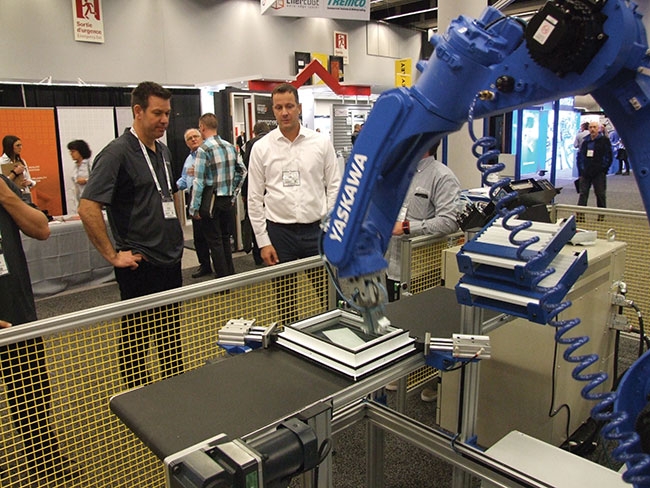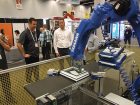
Articles
Fabrication
Rebate to innovate – Government assistance for R&D costs is out there
Government funding is out there for common product improvement efforts.
October 16, 2019 By Kira Kuperman Pro-Active Fenestration Solutions
 Robots have been around for a while. But no one uses them. The SRED program can help mitigate the risk of trying new technology.
Robots have been around for a while. But no one uses them. The SRED program can help mitigate the risk of trying new technology. Innovation was the theme at a recent FenCon conference in Manitoba. The panel gave the industry low marks for trying new things. The keynote speaker talked about disruptive technology and how it is transforming traditional businesses (minimum 50 references to Uber).
Seminars urged window and door fabricators to look at new finishes, automated processes, updated software, continuous improvement programs and other routes to becoming different and better. The message was clear: innovate as if your life depends on it!
But innovation is special because it is hard, time-consuming and costly. There is help, we are told, from government R&D funding programs to defray some of the costs of innovation. As you’ll see in the following case study, getting access to that funding can be easier than many assume – if you have help from someone who knows what they are doing.
Pro-Active Fenestration Solutions worked with a medium-sized window manufacturer in Ontario (that we’ll call Awesome Windows) to reduce the overall service costs the company was experiencing. As they went through the service records, Pro-Active realized the service call volume was too great for the number of units Awesome Windows was making per day.
Service records clearly showed that glass was the number-one concern. Dirty glass units, seal failures, chipped glass, tiny cracks – you name it, it was all there. What’s more, glass replacement was a big problem. After a couple of meetings with the general manager, the company decided to review the entire glass unit production flow to identify problem areas and come up with new ways to reduce glass problems. Some of the simpler issues such as dirty glass were easy to identify and rectify by implementing a cleaning station at the end of the glazing line. Other more serious concerns such as seal failure required more in-depth examination.
Fast forward a year. With Pro-Active’s help, Awesome Windows received more than $62,000 in cash refunds for this development work. And their glass-related service calls have been reduced by half.
Believe it or not, the Canada Revenue Agency (CRA) wants to give you money for work that fosters technological advancement. But millions of dollars go unclaimed every year because the owners of most qualifying businesses simply never apply. Many have never even heard of the Scientific Research and Experimental Development program (SRED) – even though it’s been around since 1985 – or assume they won’t qualify for benefits when they probably would.
For business owners who do take the time to apply, the rewards are very real. Every year, the SRED program hands out more than $4 billion in cash or investment tax credits to more than 18,000 companies – mainly small businesses – throughout Canada. Most companies that apply for the benefits end up receiving them.
In order to qualify, a business has to seek to innovate and improve product or process regardless of the outcome. There are three main requirements to qualify for refund.
First, your research needs to be seeking technological advancement that will improve your product or methodology. Research that has no benefit to your business is not supported, and neither is finding existing technology to help you.
Secondly, the research must include experimental work or an initiative with some uncertainty of the outcome at the end of the work. The SRED program is meant to reduce the risk in failure for companies that want to try something new. Simply implementing a tried-and-true process or cost-cutting measure does not fall within its parameters. Because you are conducting research, you’ll need contemporaneous documentation. A record of the work should be maintained as it is carried out.
Finally, you’ll have to show SRED that you are actually investing funds into research and development. Trying new things that don’t cost anything will not attract a grant.
None of the above has to mean high-tech experimentation. In fact, the vast majority of SRED claimants qualify for payouts by making practical improvements to the products they sell and install every day. Some companies perform experiments on industrial materials. Others design new tools and parts. Still others gather mathematical data about their products, or engineer new solutions to common problems, or test and refine existing ideas in their industries. All these forms of R&D will usually qualify a business for payouts, whether they apply for those benefits or not.
In the window and door industry, we perform R&D all the time, often without realizing that’s what we’re doing. We test our windows, doors and curtainwall for air leakage, water penetration, structural load and wind load resistances. We troubleshoot and problem-solve installations in progress. We perform quality assurance on existing installations. We compare the pros and cons of different materials and draw up reports on our findings. A good portion of this work may qualify for cash refund under the SRED program
If your company works to improve the structural performance of windows and mullion deflection, to improve window and door ratings per CSA A440 and NAFS, or to improve corner welding and cleaning performance – or to make any other type of improvement to windows and doors – the Canadian government is ready to pay you to keep doing that work.
Commercial success – or lack thereof – has nothing to do with these benefits. As long as you’re putting in work on experimentation and research, you almost certainly qualify regardless of what you end up doing with that research. In fact, if you are improving on product design without absolute or conclusive advance knowledge of the exact technological outcome, your company is likely performing qualified SRED activities.
About Pro-Active
Pro-Active Fenestration Solutions is a highly focused consulting firm dedicated strictly to the window and door industry. Its senior consultants all have over 30 years’ experience in the window and door industry from window and door design to profile and tooling design as well as all aspects of product testing, production and sales and marketing. In addition to technical assistance, Pro-Active also can help companies understand the SRED program offered by the Canadian government and assist fabricators to claim benefits under the program.
Print this page

